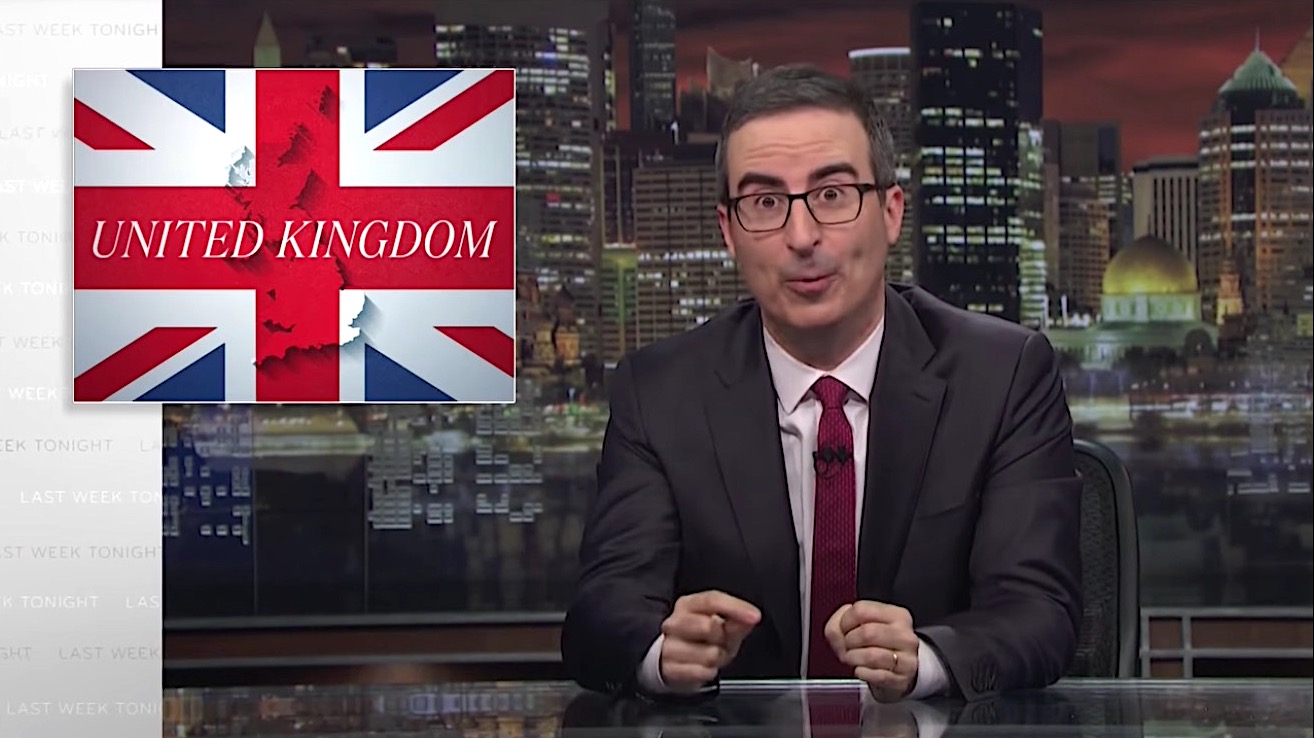John Oliver has a fiendish plan to get around Britain's censorship of his satirical use of Parliament footage


A free daily email with the biggest news stories of the day – and the best features from TheWeek.com
You are now subscribed
Your newsletter sign-up was successful
Last week's Last Week Tonight had a segment about the speaker of Britain's House of Commons delivering put-downs, but nobody in Britain saw it, John Oliver said on Sunday's show. "And not for the normal reasons of disinterest, ignorance about this show's existence, or longstanding aversion to my name and face." At the designated spot in the U.K., he said, the show "just cut to black — like I'd just been murdered on The Sopranos. And the reason for that is, in the U.K., it is, unbelievably, against the law to use footage from the House of Commons for the purpose of comedy. It's true!"
"This law is patently offensive," Oliver said. "Britain is supposed to be one of the world's great free societies. We came up with the Magna Carta, and we allow a product called 'Daddies Brown Sauce' to be sold, regardless of how disturbing that sounds. That's freedom right there! And this anti-satire law isn't just hypocritical, it is a legitimate burden because it's genuinely hard to use parliamentary footage for purposes that are not comedy. Parliament is inherently ridiculous." He showed some examples.
"The fact that we are using parliamentary footage in making fun of this means that this part of the show is now going to be blacked out in the U.K. tomorrow as well, which is genuinely insane and frankly antidemocratic," Oliver said. So to punish Britain — or Oliver's fans in Britain? — Last Week Tonight will replace this part of the show in the U.K. with five minutes of footage of Gilbert Gottfried reading three-star Yelp reviews of restaurants in Boise, Idaho. You can get a mercifully short taste of that below. Peter Weber
The Week
Escape your echo chamber. Get the facts behind the news, plus analysis from multiple perspectives.

Sign up for The Week's Free Newsletters
From our morning news briefing to a weekly Good News Newsletter, get the best of The Week delivered directly to your inbox.
From our morning news briefing to a weekly Good News Newsletter, get the best of The Week delivered directly to your inbox.
A free daily email with the biggest news stories of the day – and the best features from TheWeek.com
Peter has worked as a news and culture writer and editor at The Week since the site's launch in 2008. He covers politics, world affairs, religion and cultural currents. His journalism career began as a copy editor at a financial newswire and has included editorial positions at The New York Times Magazine, Facts on File, and Oregon State University.
-
 What are the best investments for beginners?
What are the best investments for beginners?The Explainer Stocks and ETFs and bonds, oh my
-
 What to know before filing your own taxes for the first time
What to know before filing your own taxes for the first timethe explainer Tackle this financial milestone with confidence
-
 The biggest box office flops of the 21st century
The biggest box office flops of the 21st centuryin depth Unnecessary remakes and turgid, expensive CGI-fests highlight this list of these most notorious box-office losers
-
 ‘One Battle After Another’ wins Critics Choice honors
‘One Battle After Another’ wins Critics Choice honorsSpeed Read Paul Thomas Anderson’s latest film, which stars Leonardo DiCaprio, won best picture at the 31st Critics Choice Awards
-
 Son arrested over killing of Rob and Michele Reiner
Son arrested over killing of Rob and Michele ReinerSpeed Read Nick, the 32-year-old son of Hollywood director Rob Reiner, has been booked for the murder of his parents
-
 Rob Reiner, wife dead in ‘apparent homicide’
Rob Reiner, wife dead in ‘apparent homicide’speed read The Reiners, found in their Los Angeles home, ‘had injuries consistent with being stabbed’
-
 Hungary’s Krasznahorkai wins Nobel for literature
Hungary’s Krasznahorkai wins Nobel for literatureSpeed Read László Krasznahorkai is the author of acclaimed novels like ‘The Melancholy of Resistance’ and ‘Satantango’
-
 Primatologist Jane Goodall dies at 91
Primatologist Jane Goodall dies at 91Speed Read She rose to fame following her groundbreaking field research with chimpanzees
-
 Florida erases rainbow crosswalk at Pulse nightclub
Florida erases rainbow crosswalk at Pulse nightclubSpeed Read The colorful crosswalk was outside the former LGBTQ nightclub where 49 people were killed in a 2016 shooting
-
 Trump says Smithsonian too focused on slavery's ills
Trump says Smithsonian too focused on slavery's illsSpeed Read The president would prefer the museum to highlight 'success,' 'brightness' and 'the future'
-
 Trump to host Kennedy Honors for Kiss, Stallone
Trump to host Kennedy Honors for Kiss, StalloneSpeed Read Actor Sylvester Stallone and the glam-rock band Kiss were among those named as this year's inductees
